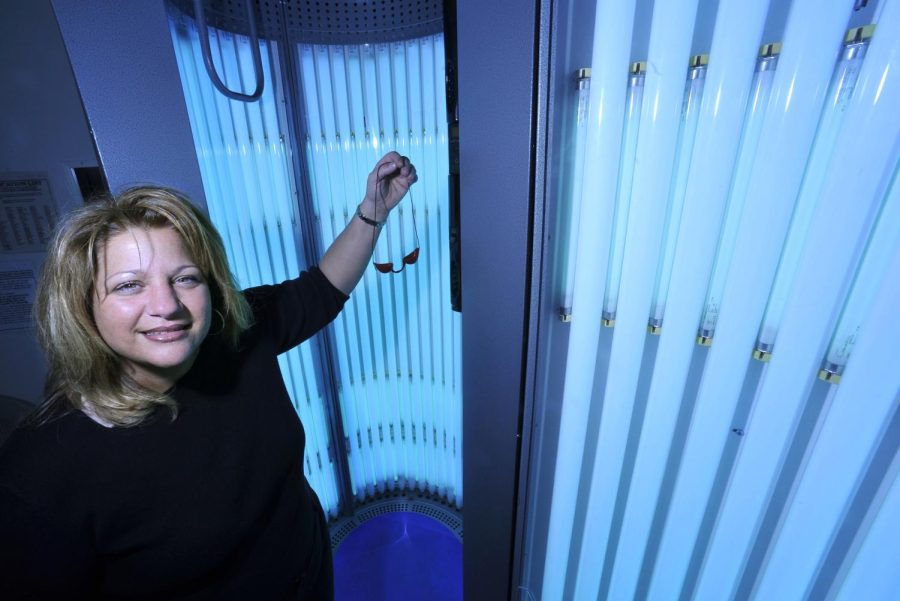Fun or dangerous: A look at indoor tanning
As scientific warnings on tanning have increased so have taxes and regulations on tanning salon operators such as Michele Lanasa who owns a salon in Pasadena, Maryland, where she is shown on April 26, 2010. (Amy Davis/Baltimore Sun/MCT)
October 18, 2015
With fall officially in full swing, many people have given up on getting their dose of the sun outdoors.
For those who still need to get their “bronze on,” tanning beds and sun lamps are a year-round option. However, tanning beds still give off ultraviolet (UV) radiation, usually more than 15 times that what the sun gives off.
This increased UV radiation can lead to a higher risk of developing skin cancer, premature aging, and melanoma.
Indoor tanners tend to be young, non-Hispanic white (NHW) women, according to a 2010 study published by the National Health Interview Survey. The study also showed that 32 percent of NHW women aged 18 to 21 regularly tanned compared to the 30 percent of women aged 22 to 25.
The dangers of tanning are quite real though. The World Health Organization’s International Agency for Research on Cancer (IARC) places tanning beds and tanning lamps into its highest cancer risk category – carcinogenic to humans.
In addition, 90 percent of melanomas are estimated to be caused by UV exposure. The risk of melanoma also increases by 75 percent when tanning bed use started before age 35
Zabrina Hvostal, a junior public relations major, has been tanning since her teens.
“I started tanning when I was fourteen years old,” Hvostal said, who started after she got her first week-long tanning package.
“I got a package here and there. I didn’t start tanning year-round… because I don’t think it’s legal to in Pennsylvania,” Hyostal said. “When I was 16, I got my first three-month package and ever since I’ve been tanning year-round. I still tan year-round. I go around three times a week.”
Hvostal was correct about the legality issue in Pennsylvania.
Because of the health dangers associated with tanning and businesses’ tendency to market toward teens, many states are passing laws to prevent minors from using indoor tanning services.
In Pennsylvania, no one age 16 or younger is allowed to use a tanning facility and 17 year olds must have written consent from a parent or legal guardian.
As for her health, Hvostal is aware of the risks that come with tanning but says that she is caught up in its addictiveness.
“Tanning is actually an addiction, you can look up and read about people who are addicted to (it.) I am addicted to tanning,” Hvostal said.
Other students are adamant in their views of tanning. Megan Hermensky, a junior public relations major, avoids tanning because of her own history with skin cancer.
“I’ve had surgery four times because of skin cancer, and the first (time) I…had surgery was because of it in second grade,” Hermensky said.
Because of this, Hermensky views excessive tanning as irresponsible.
“In my opinion, the health risks completely outweigh the benefits and I think a lot of people don’t really realize that until it’s too late,” she said.
Much like Hvostal, Hermensky agrees that tanning is an addiction and believes that state governments should pass laws to protect minors.
“The sooner that someone starts tanning the sooner they’re going to see the negative repercussions that come with tanning. If we don’t allow minors to smoke or drink in order to prevent them from harming their bodies, why should we give them access to other harmful outlets,” she said.
Despite the differing opinions, tanning still remains a popular activity among college-aged girls.
At Kent State, many factors like harsh winters and the fact that a number of apartment complexes offer tanning beds, keep many people hooked on it.
While its popularity still stays consistent, the dangerous health risks that come with tanning cannot be ignored.
Shane Beneke is the health reporter for The Kent Stater. Contact him at [email protected].

























